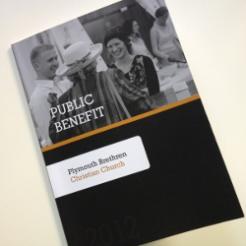Conservative MP Charlie Elphicke has accused the Charity Commission of trying to suppress religion and predicted that the Plymouth Brethren case, where the organisation has been refused charity status, will be the first of many.
Elphicke, a member of the Public Administration Select Committee, made the comments at a PASC hearing on public benefit and charitable status yesterday morning.
Elders from the Plymouth Brethren, an exclusive and evangelical Christian sect, had been giving evidence about the Charity Commission’s refusal to continue their charitable status when Elphicke asked them if they thought the Commission was “actively trying to suppress religion in the UK, particularly the Christian religion”.
Elder Garth Christie responded: “I think we would share those concerns.”
Asked by Elphicke whether the elders thought the Charity Commission’s actions amounted to incompetence, or deliberate wickedness, Christie said: “It does seem very odd.”
Labour MP Paul Flynn said it was ridiculous to suggest Christians are discriminated against in this country, given the immense position and privilege enjoyed by the Church of England.
But Elphicke told the elders: “I think they [the Commission] are committed to the suppression of religion and you are the little guys being picked on to start off a whole series of other churches who will follow you there.”
Elders’ evidence to committee
In their evidence to the committee, the elders said they were at a loss to understand why the Commission had refused them charitable status. The reason given, that the Brethren lived apart from the rest of society and so did not provide public benefit, was simply not correct, they said.
Elder Bruce Hazell, who peppered his evidence with quotes from the scriptures, said anyone was welcome to attend the church’s services, and cited a variety of ways that the church members interact with outsiders and provide public benefit.
These included regular street preaching, distributing Christian booklets and Bibles; giving away hot food and drinks; visiting people in hospitals and prisons; fundraising for other charities, and providing employment for 4,500 non-Brethrens.
Christie added that the Charity Commission was made well aware of these things so the church could not conceive why it had been denied charitable status. The church had even published a report detailing its public benefit (pictured).
He added that it didn’t seem fair that the Druids had won charitable status with just 350 members, and the Brethren, with 16,000 members and over 300 churches or meeting halls, had been refused.
Paul Flynn: unwelcome intrusion
Labour’s Flynn commented that if he was lying ill in hospital and the Brethren turned up to visit, “I think it would give me a relapse.” He asked the elders whether they accepted that many people would regard the Brethren’s street preaching, handing out of literature, and hospital visits, as “unwelcome”. After a pause, Hazell replied: “Well, we wouldn’t resign from it, Mr Flynn, it’s our life.”
Christie told the committee that the “tussle” between the Brethren and the regulator had been going on for seven years now, and the Brethren had “wasted” many hundreds of thousands of pounds arguing its case. “If we end up going all the way to Strasbourg – which we will if we have to, to argue this principle – then we really don’t know what the end cost will be.”
He said the cost was manageable for an organisation the size of the Brethren church, but if the Charity Commission was to apply the same pressure to smaller independent churches, it would be “curtains” for them.
Under questioning, the elders admitted that the main advantage that charity status bestows on the charity is the financial benefit from tax reliefs including gift aid. But Christie insisted that "as a Christian organisation we are totally righteous in our financial affairs".
Commission letter: No presumption that religion is for the public benefit
He quoted from the Charity Commission’s letter to the Brethren advising that charitable status would be refused: “This decision makes it clear that there is no presumption that religion generally, or at any more specific level, is for the public benefit, even in the case of Christianity or the Church of England. The case law on religion is rather ambiguous. Our view is that the definition is rather dated, and it is our job to define it adequately.”
But Christie said the Brethren believe that that is a job for Parliament, not the Charity Commission.
He added that Ed Miliband, the minister that saw the Charities Act through Parliament in 2006, said at the time that removing the presumption of public benefit from religious charities “was not intended to lead to a narrowing down of the range of religious activities that could be considered charitable”.
A better way
Committee chair Bernard Jenkin MP wondered whether there was any other route the Charity Commission could take to test the application of the public benefit requirement, instead of having to take a specific case through the tribunal system. “The problem at the moment is that the process for trying to clarify an area of law always seems to be done at an individual charity’s expense,” he said.
Nicola Evans, a senior charity lawyer at Bircham Dyson Bell, said the regulator could make a reference to the Attorney General, though usually those charities that are likely to be affected will apply to take part in the proceedings anyway.
Jenkin concluded: “Whatever the merits or demerits of the Charity Commission’s view, this process of testing the law on a relatively vulnerable organisation and putting it through huge time and expense is the wrong way to decide what charity law means.”









